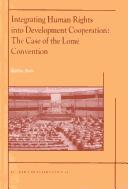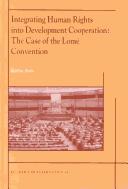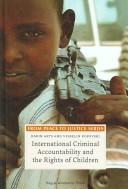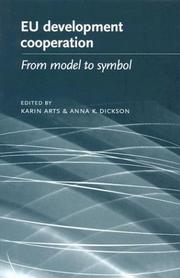| Listing 1 - 10 of 13 | << page >> |
Sort by
|

ISBN: 9041113568 9004482490 Year: 2000 Publisher: Hague, Netherlands ; Cambridge, Mass. : Kluwer Law International,
Abstract | Keywords | Export | Availability | Bookmark
 Loading...
Loading...Choose an application
- Reference Manager
- EndNote
- RefWorks (Direct export to RefWorks)
Human rights --- Economic development --- Droits de l'homme --- Développement économique --- Lomé Convention --- Economic development. --- Développement économique --- Lomé Convention

ISBN: 9789004482494 9789041113566 Year: 2000 Publisher: Leiden; Boston : Brill | Nijhoff
Abstract | Keywords | Export | Availability | Bookmark
 Loading...
Loading...Choose an application
- Reference Manager
- EndNote
- RefWorks (Direct export to RefWorks)
Human rights, democracy and governance concerns are prominent elements in the development cooperation policy of the European Community. The relations between the European Community (EC) and 71 developing countries in Africa, the Caribbean and Pacific (ACP) have proved to be a laboratory for developing ideas on these matters, for translating them into binding treaty norms, and for applying them in practice. The experiences gained in the ACP-EC relationship carry special value because they are the product of dialogue and joint decision-making between groups of developed and developing states. Therefore, 25 years of ACP-EC cooperation under the Lomé Convention provide a rich learning ground for anybody involved or interested in (the debate on) linking development cooperation to human rights and to human rights related concerns. This book explores the international law aspects of the subject. It first investigates the general international legal basis for linking development cooperation to human rights, democracy and good governance. Both the negative and positive ways of making such a linking (by punitive and supportive measures) are addressed. The book then delves into the evolution of Lomé treaty norms on the subject, and into the concrete human rights practices that took shape under them. It explores the contributions to and influence of both the EC and ACP states on those treaty provisions and practices. A comprehensive overview is provided of the support measures and sanctions resorted to in response to the human rights situation in ACP countries. The book assesses the overall experiences gained and presents a synthesis of factors that proved to be constraints or conducive to the efforts to integrate human rights fully into ACP-EC development cooperation. The insights gained could well inform similar efforts undertaken by others.

ISBN: 9067042277 9789067042277 Year: 2006 Publisher: The Hague Hague Academic Press
Abstract | Keywords | Export | Availability | Bookmark
 Loading...
Loading...Choose an application
- Reference Manager
- EndNote
- RefWorks (Direct export to RefWorks)
Children and young persons are increasingly being targeted for trafficking, sexual exploitation, recruitment as child soldiers, and other abuses. Children prove to be particularly vulnerable in situations of armed conflict, such as Darfur, the Democratic Republic of Congo, the Philippines, Nepal, and Colombia. A rich combination of practitioners (including ICC, ICTY and SCSL prosecutors) and academics explore to what extent international law instruments and international criminal accountability mechanisms are useful for countering violations of children's rights during and after armed conflicts. They also analyze to what extent the tendency of profiling children's rights much more strongly than before (mainly under the umbrella of the 1989 UN Convention on the Rights of the Child and in the form of child rights-based approaches) converges with the features of international criminal accountability mechanisms such as the International Criminal Court, the Yugoslavia and Rwanda Tribunals, and the Special Court for Sierra Leone.
Children (International law) --- Children's rights. --- Criminal justice, Administration of. --- International criminal courts. --- Children (International law). --- Responsabilité pénale des mineurs --- Enfants soldats --- Droits de l'homme (droit international) --- Statut juridique (droit international) --- Human rights --- Criminal law. Criminal procedure --- Law of armed conflicts. Humanitarian law --- Childrens rights --- International criminal courts --- Criminal justice, Administration of --- Enfants --- Tribunaux criminels internationaux --- Children's rights --- Responsabilité pénale des mineurs. --- Responsabilité pénale des mineurs.
Book
ISBN: 9781108497947 1108497942 1108590411 110858666X 110864211X 9781108586665 9781108466080 Year: 2019 Publisher: Cambridge Cambridge University Press
Abstract | Keywords | Export | Availability | Bookmark
 Loading...
Loading...Choose an application
- Reference Manager
- EndNote
- RefWorks (Direct export to RefWorks)
Mobilising International Law for 'Global Justice' provides new insights into the dynamics between politics and international law and the roles played by state and civic actors in pursuing human rights, development, security and justice through mobilising international law at local and international levels. This includes attempts to hold states, corporations or individuals accountable for violations of international law. Second, this book examines how enforcing international law creates particular challenges for intergovernmental regulators seeking to manage tensions between incompatible legal systems and bringing an end to harmful practices, such as foreign corruption and child abduction. Finally, it explores how international law has local resonance, whereby, for example, cities have taken it upon themselves to give effect to the spirit of international treaties that national governments fail to implement, or even may have refused to ratify.
International law and human rights --- International law --- Humanitarian law --- Humanitarian conventions --- International humanitarian law --- War (International law) --- Law of nations --- Nations, Law of --- Public international law --- Law --- Human rights and international law --- Human rights --- Political aspects --- International law and human rights. --- Political aspects. --- Political philosophy. Social philosophy

ISBN: 9789004481497 9789041120212 Year: 2003 Publisher: Leiden; Boston : Brill | Nijhoff
Abstract | Keywords | Export | Availability | Bookmark
 Loading...
Loading...Choose an application
- Reference Manager
- EndNote
- RefWorks (Direct export to RefWorks)
Despite the existence of a wide range of human rights instruments and procedures, human rights violations still abound. The authors of this book address this so-called human rights deficit, and the possible responses to it, from various disciplinary angles and mostly in the context of development. They explore the reasons for the continuation of economic, social and/or political exclusion and human rights violations at large. They also present keys for redressing the human rights deficit. The role of law, and questions of universality, inclusion and exclusion are central themes in this book. The need to take up civil and political rights and economic social and cultural rights on equal footing is recognized by several of the authors, and so is that of bridging the public-private divide. Specific contributions address among others the importance of human rights training and education, the role of NGO's in a globalizing world, minorities, gender and women's rights, accountability of multinational corporations, and the problem of human trafficking.

ISBN: 0719062985 9786610734269 1847790704 1280734264 1423706420 0719062993 9781423706427 9781847790705 9781526137340 9781280734267 6610734267 1526137348 9780719062988 Year: 2004 Publisher: Manchester ; New York : Manchester University Press,
Abstract | Keywords | Export | Availability | Bookmark
 Loading...
Loading...Choose an application
- Reference Manager
- EndNote
- RefWorks (Direct export to RefWorks)
EU development cooperation policy has ceased to be unique and perhaps has become more symbolic than substantive. This books analyses the external and internal influencing factors which have contributed to the drastic changes to this policy.
Development economics --- Economie du développement --- European Union --- Economic assistance, European --- Economic assistance, European. --- European Union -- Developing countries. --- Economic Theory --- Business & Economics --- Economie du développement --- European economic assistance --- E.U. --- European Union. --- Europe --- Economy --- IMF --- EU --- Financial --- E-books --- economy --- imf --- eu --- financial --- europe --- Africa --- African --- Caribbean and Pacific Group of States --- Developing country --- Development aid --- France --- Lomé --- Member state of the European Union
Book
ISBN: 9780719062995 Year: 2009 Publisher: Manchester Manchester university press
Abstract | Keywords | Export | Availability | Bookmark
 Loading...
Loading...Choose an application
- Reference Manager
- EndNote
- RefWorks (Direct export to RefWorks)
Book
ISBN: 9789899616103 Year: 2009 Publisher: Leiden : IPJET,
Abstract | Keywords | Export | Availability | Bookmark
 Loading...
Loading...Choose an application
- Reference Manager
- EndNote
- RefWorks (Direct export to RefWorks)
Self-determination, National --- Droit des peuples à disposer d'eux-mêmes --- Western Sahara --- Sahara occidental --- Boundaries. --- Politics and government --- Frontières --- Politique et gouvernement
Book
Year: 2020 Publisher: Amsterdam Stichting KidsRights
Abstract | Keywords | Export | Availability | Bookmark
 Loading...
Loading...Choose an application
- Reference Manager
- EndNote
- RefWorks (Direct export to RefWorks)
De KidsRights Index wordt gepubliceerd op basis van kwantitatieve data van de VN en kwalitatieve observaties van het Kinderrechtencomité in Genève, ism de Erasmus School of Economics en het Institute of Social Studies.De Index gaat na in hoeverre landen zich inzetten om kinderrechten te verbeteren, kinderen gehoord worden en hun belangen worden meegenomen in het beleid en bekijkt hierbij 5 domeinen:– leven– onderwijs– gezondheid– bescherming– kinderrechten-klimaatDoel van de KidsRights Index is de naleving van kinderrechten wereldwijd te stimuleren.De Index van 2020 laat zien dat landen wereldwijd onvoldoende budget toekennen aan het waarborgen van kinderrechten, vooral als het gaat over bescherming, gezondheid en educatie. Door de economische gevolgen van de coronacrisis wordt verwacht dat hier op korte termijn geen verandering in te zien valt.
Book
ISBN: 1316083322 1316057321 1316054950 131608096X 110742738X 1316071502 1139871366 1316078604 1316076237 1316073866 9781316073865 1107074789 1322177120 9781316057322 9781316078600 9781139871365 9781107427389 9781107074781 9781107427389 Year: 2014 Publisher: Cambridge, United Kingdom
Abstract | Keywords | Export | Availability | Bookmark
 Loading...
Loading...Choose an application
- Reference Manager
- EndNote
- RefWorks (Direct export to RefWorks)
Experts are increasingly relied on in decision-making processes at international and European levels. Their involvement in those processes, however, is contested. This timely book on the role of 'experts' provides a broad-gauged analysis of the issues raised by their involvement in decision-making processes. The chapters explore three main recurring themes: the rationales for involving experts and ensuing legitimacy problems; the individual and collective dimensions of expert involvement in decision making; and experts and politics and the politics of expertise. With contributions from leading scholars and practitioners, they theorize the experts' involvement in general and address their role in the policy areas of environment, trade, human rights, migration, financial regulation, and agencification in the European Union.
Decision making. --- Consultants. --- Specialists. --- Authorities (Persons) --- Experts --- Persons --- Intellectuals --- Advisors --- Specialists --- Deciding --- Decision (Psychology) --- Decision analysis --- Decision processes --- Making decisions --- Management --- Management decisions --- Choice (Psychology) --- Problem solving --- Decision making --- Consultants --- E-books
| Listing 1 - 10 of 13 | << page >> |
Sort by
|

 Search
Search Feedback
Feedback About UniCat
About UniCat  Help
Help News
News